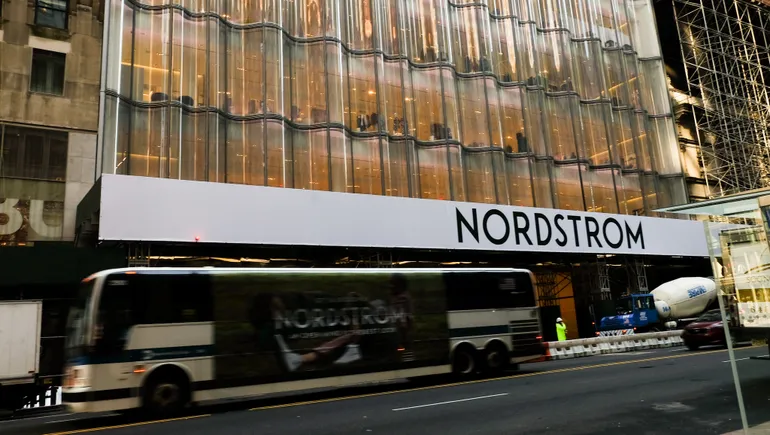Listen to the article
Tariffs, already a challenge to the retail sector and U.S. economy more broadly, could scuttle plans to take Nordstrom private and return a majority stake to the founding family, according to research Tuesday from William Blair analysts Dylan Carden and Anna Linscott.
This outcome at Nordstrom isn’t likely at the moment, but the risk is more than zero and could grow as long as tariffs linger, the analysts said. The speculation reflects the far-reaching and perhaps unintended consequences of a trade policy whose signature has been uncertainty, if not chaos.
“It is worth stating up front that while the potential downside for shares under a no-deal scenario is compelling, we give small odds to a broken deal here within a month of closing,” Carden wrote.
The deal was forged a couple of days before Christmas when the company’s board unanimously approved an agreement between family members — including Erik, Pete and Jamie Nordstrom — and Mexican department store operator El Puerto de Liverpool. The closing date for the all-cash transaction, valued at about $6.25 billion, is penciled in for the week of May 18, following a special shareholders meeting on May 16, per financial filings.
In one scenario, Liverpool, which is slated to take a 49.9% stake, could take advantage of the tariff-weakened macroeconomic backdrop to renegotiate the price, according to the William Blair analysts, who note that Prada and LVMH have demonstrated precedents for this. Prada cited tariff risk in knocking about 14% off what it paid Capri for Versace earlier this month, William Blair said; and LVMH invoked the pandemic when it successfully shaved $400 million off its purchase of Tiffany five years ago.
“This is probably the most credible scenario, but there is limited visibility as to Liverpool’s thinking and strategy,” Carden said, but added, “In speaking with investors, there is not a great sense as to how sharp Liverpool’s elbows are. As a family-run business that theoretically will have to work with the Nordstroms over the coming decades, we are inclined to think this is less of a risk.”
Neither Liverpool nor Nordstrom immediately returned requests for comment from Retail Dive regarding the potential risks that tariffs could pose to their arrangement.
The longer tariffs, which include levies both on and from various countries, remain on the books, the more likely they could imperil the go-private plan, according to the analysts’ research.
“Liverpool might try to leverage the current environment to get a better deal, but that risk really only grows as we prolong tariff negotiations, and it looks like the administration is thawing there, going by recent headlines,” Carden said by email.
There are also provisions for Liverpool to walk away if Nordstrom’s debt slides below investment grade, though according to financial filings that would require downgrades from multiple ratings agencies. Following the go-private announcement in December, Fitch Ratings analysts affirmed Nordstrom’s BB rating, and said the deal’s “financing package minimally impacts Nordstrom’s credit profile.” In March, Moody’s Ratings affirmed its long-term rating and stable outlook, saying Nordstrom’s “credit profile is supported by its solid market positioning in both the full price and off-price segments as well as its conservative approach to funded debt and good liquidity.”
While any deterioration in the company’s outlook could influence the ratings agencies, the deal is scheduled to close well ahead of the assessment of its Q1 performance, given that last year’s report wasn’t released until May 30, per William Blair.
The analysts listed concerns around a tariff-induced recession that they said could lead the Nordstroms to ditch the deal, but said they “believe the family’s desire to get this deal done is relatively profound.”
Erik and Pete Nordstrom’s great-grandfather launched the business as a shoe store in Seattle in 1901. The family tried but failed to take it private eight years ago.

